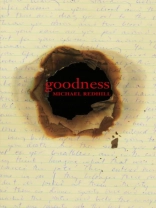This remarkable autobiographical play by the award-winning author of Building Jerusalem and Martin Sloane, is a Russian-doll-like play: concentric stories enveloping each other. A writer is told, in confidence, a terrible tale of murder and injustice and he promises never to repeat the story. Goodness is the writer breaking his word.
Recently divorced, Michael Redhill goes to Poland to get away frm his life and to do some research on the Holocaust. Thwarted by witnesses unwilling to talk, he returns home via England, but in London is introduced to someone who can tell him a 'real’ story of evil. Through this reluctant witness, Redhill learns of a genocide. He encounters, through the memory of the storyteller, an alleged war criminal, about to be put on trial. But this is an old man with Alzheimer’s who can no longer remember the time his crimes were allegedly committed. Has his guilt dissolved with his memory? Could he be pretending to be ill in order to escape punishment? The witness conjures for Redhill the war criminal’s passionate and beautiful daughter, who will defend her father at all costs. There is also the prosecuting attorney, who has much in common with the old man whose destruction he seeks. As well as an uncomfortable attraction to his daughter. Each is drawn to the other. All is witnessed by a female prison guard – the one who tells the playwright, years later, what really happened in the quest to give a nation some closure. Everyone’s story is compelling, and the ending is as unexpected as it is shocking.
Who do we believe? A prison guard still wounded by history? A writer suffering from heartache? A dying war criminal? What is our responsibility? Who does memory serve? Did the past really happen? And if it did, who has a claim on it?
Goodness is a play about what happens in the gaps between experiencing, telling and hearing.












